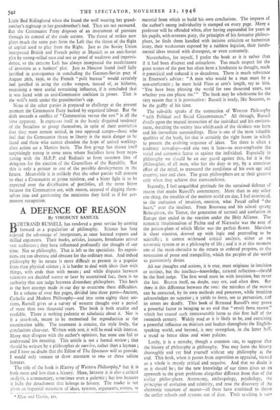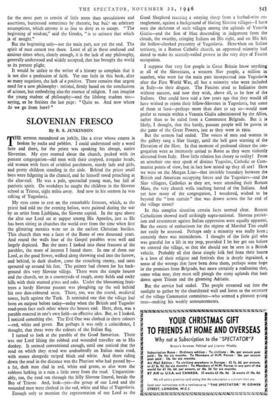A DEFENCE OF REASON
By VISCOUNT SAMUEL
BERTRAND RUSSELL has rendered a great service by coming forward as a populariser of philosophy. Science has long enjoyed the advantage of interpreters, at once learned experts and skilled exponents. Their books, articles, lectures, broadcasts attract vast audiences ; they have influenced profoundly the thought of our time. Not so philosophy. That is left to the specialists. Its exposi- tions are too abstruse and obscure for the ordinary man. And indeed philosophy by its nature is more difficult to present in a popular form than physical science ; it is harder to deal with ideas than with things, with ends than with means ; and while disputes between scientists are decided sooner or later by ascertained fact, there is no authority that can judge between discordant philosphers. This book is the best attempt made in our day to overcome these difficulties.
In a volume of over Boo pages, divided into three parts—Ancient, Catholic and Modern Philosophy—and into some eighty short sec- tions, Russell gives us a survey of western thought over a period of more than two thousand years. The book is both erudite and readable. There is nothing pedantic or scholastic about it. Nor is it a text-book, meant to be memorised for reproduction at the examination table. The treatment is concise, the style lively, the eonclusions clear-cut. Written with zest, it will be read with interest. Many may disagree with the author's opinions, but none can fail to understand his meaning. This article is not a formal review ; that should be written by a philosopher de carriere, rather than a layman ; and I have no doubt that the Editor of The Spectator will so provide. I would only venture to draw attention to two or three salient features.
The title of the book is History of Western Philosophy,* but it is both more and less than a history. More, because it is also a critical analysis, a commentary, sometimes even a polemic ; but less because it lacks the detachment that belongs to history. The reader is not given an impartial statement of ideas, systems, arguments, events, 9S * Allen and Unwin, 2IS.
material from which to build his own conclusions. The impress of the author's strong individuality is stamped on every page. Many a professor will be offended when, after having expounded for years to his pupils, with reverent piety, the principles of his favourite philoso- phers, he finds them handled with incisive criticism or humorous irony, their weaknesses exposed by a ruthless logician, their funda- mental ideas treated with disrespect, or even contumely.
Nevertheless, for myself, I prefer the book as it is rather than if it had been discreet and colourlesss. Too much respect for the great names of the past has often been a hindrance to thought, made it parasitical and reduced it to decadence. There is much substance in Emerson's advice : " A man who would be a man must be a non-conformist ; he must hold Plato at arm's length, say to him, ' You have been pleasing the world for two thousand years, see whether you can please me.' " The book may be wholesome for the very reason that it is provocative: Russell is ready, like Socrates, to be the gadfly of his time.
The sub-title speaks of the connection of Western Philosophy " with Political and Social Circumstances." All through, Russell dwells upon the mutual interaction of the intividual and his environ- ment, sketching the society into which each of the thinkers was born and his immediate surroundings. Here is one of the most valuable qualities of the book, for that is certainly the right frame in which to present the evolving sequence of ideas. Yet there is often a tendency nowadays—and one sees it here—to over-emphasise the social and economic factor as against the individual. Especially in philosophy we should be on our guard against this, for it is the philosopher, of all men, who has the duty to try, by a conscious effort of the mind, to transcend the conditions of his own age and country, race and class. The great philosophers are at their greatest only when they achieve that transcendence.
Secondly, I feel unqualified gratitude for the sustained defence of reason that marks Russell's commentary. More than to any other one thing, the troubles of the modern world are due, I feel convinced, to the exaltation of intuition, emotion, what Pascal called " the heart," over the intellect. From Rousseau and his school sprang Robespierre, the Terror, the generation of turmoil and confusion in Europe that ended in the reaction under the Holy Alliance. The romantic intuitionalism of Fichte and of Nietzsche was the root of the poison-plant of which Hitler was the perfect flower. Marxism is sheer emotion, dressed up with logic and pretending to be scientific ; it cannot withstand critical analysis, either as an economic system or as a philosophy of life ; and it is at this moment one of the main obstacles to the return to ordered progress, to the restoration of peace and tranquillity, which the peoples of the world so passionately desire.
All our thoughts and actions, it is true, must originate in intuition or instinct, but the intellect—knowledge, rational reflection—should be the final judge. The first word must be with intuition, but never the last. Reason itself, no doubt, may err, and often does. BM there is this difference between the two: the mistakes of the reason can be corrected, by its own methods and processes, while intuition acknowledges no superior ; it yields to force, not to persuasion, and its errors are deadly. This book of Bertrand Russell's may prove a powerful factor in bringing to an end that "revolt from reason" which has caused such immeasurable harm to this first half of the twentieth century. Widely read as it is likely to be, and exercising a powerful influence on thinkers and leaders throughout the English- speaking world, and beyond, it may strengthen, in the latter half, a trend to better ideas and wiser policies.
Lastly, it is a mistake, though a common one, to suppose that the history of philosophy is philosophy. You may learn the history thoroughly and yet find yourself without any philosophy at the end. This book, when it passes from exposition to appraisal, viewed as a whole is mainly critical and negative. And that no doubt is as it should be ; for the new knowledge of our times gives us an approach to the great problems altogether different from that of the earlier philosophers. Astronomy, anthropology, psychology, the principles of evolution and relativity, and now the discovery of the electronic structure of matter—all these have combined to throw the earlier schools and systems out of date. Their teaching is seen for the most part to consist of little more than speculations and assertions, buttressed sometimes by rhetoric, but built on arbitrary assumptions, which anyone is as free to deny as to accept. " The beginning of wisdom," said the Greeks, " is to unlearn that which is of naught."
But the beginning only—not the main part, nor yet the end. The spirit of man cannot rest there. Least of all in these confused and anxious times when, clearly enough, it is the lack of any philosophy, generally understood and widely accepted, that has brought the world to its present plight.
It would be unfair to the writer of a history to complain that it is not also a profession of faith. Yet one feels in this book, after so many negations, the lack of a positive. There remains that urgent need for a new philosophy: rational, firmly based on the conclusions of science, but embodying also the essence of religion. I can imagine the young student of philosophy—and the lifelong student too— saying, as he finishes the last page: " Quite so. And now where do we go from here? "



































 Previous page
Previous page